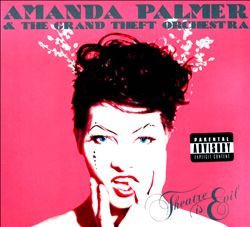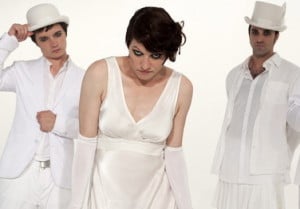Artist: Amanda Palmer and the Grand Theft Orchestra
Album: Theatre is Evil
Amanda Palmer exists in that odd demi-celebrity where most people haven’t heard of her, but many who *have* heard of her, and formed opinions, have done so without ever hearing her music. Skip down to the asterisks if you don’t care, cuz I want to speak of those issues. I think she and novelist  Neil Gaiman make an adorable couple. I don’t think it was her job to maintain the health of Mr. Gaiman’s first marriage. I think she had every right in the world to raise $1.2 million on Kickstarter rather than asking her husband to finance her like a kept woman. It does seem clear that she’s an utterly incompetent money-manager, a trait I disapprove of; but if she offers her next album on a pick-your-price-from-$1-to-$20 basis like she offered Theatre is Evil, I’ll at least match the $10 I spent this time, because her music’s worth it. As for the controversy that roused Steve Albini, I’ll quote the end of my critics’ poll ballot entry labeled Best Live Show: “And sure, it would’ve been nice if her town-by-town rented clarinetist and flautist (I think?) were paid in money along with drinks and company; I’m a unionist, I get it. But those two guest musicians never looked anything other than thrilled to be there; and I, in their place, would have felt the same”. (She went back and paid everyone once the controversy took off. I truly think no harm was meant.)
Neil Gaiman make an adorable couple. I don’t think it was her job to maintain the health of Mr. Gaiman’s first marriage. I think she had every right in the world to raise $1.2 million on Kickstarter rather than asking her husband to finance her like a kept woman. It does seem clear that she’s an utterly incompetent money-manager, a trait I disapprove of; but if she offers her next album on a pick-your-price-from-$1-to-$20 basis like she offered Theatre is Evil, I’ll at least match the $10 I spent this time, because her music’s worth it. As for the controversy that roused Steve Albini, I’ll quote the end of my critics’ poll ballot entry labeled Best Live Show: “And sure, it would’ve been nice if her town-by-town rented clarinetist and flautist (I think?) were paid in money along with drinks and company; I’m a unionist, I get it. But those two guest musicians never looked anything other than thrilled to be there; and I, in their place, would have felt the same”. (She went back and paid everyone once the controversy took off. I truly think no harm was meant.)
I also hear complaints that she’s an extreme self-promoter, via Twitter and/or strategic public nudity. I am unable to object to the latter. As for Twitter, I ignore it because the 140-character limit offends the depths of my innermost thoughts. Sure, *some* of my Facebook statuses could fit: “There are two kinds of people in this world: those who can enjoy a well-constructed dichotomy, and justice for all by Metallica”, or “Why is it that when a girl sleeps with a ton of guys, she’s a slut, but if a guy does it, all of a sudden he’s gay?”, or “Why did Heraclitus cross the river? To find out whether, when he double-crossed it later, it would know to feel betrayed”. But there’s no room to tell a story on Twitter — “Two roads diverged in a wood, and I: I took the one less traveled by. It was hard to dig up, unwieldy to carry; the forest rangers caught up to me, and charged me with felony larceny. I pointed out that folks were hardly using the damn thing, and that made not the slightest difference” — or even to pass on life advice as basic as “Give a fish a smaller fish, and he’ll eat for a minute. Teach a fish to support expanded offshore drilling rights, and he might luck out and become a giant mutant sea-monster fish with 11 eyes and savage teeth”. A man has a right to choose his editorial limits. As does Amanda, so more power to her if she works well with hers.
*******
Her music: that’s why I care. Back when she led a piano-and-drums cabaret-punk duo, the Dresden Dolls was my favorite album of 2003 and Yes, Virginia was my favorite album of 2006. Her solo debut Who Killed Amanda Palmer?, produced by Ben Folds, sounded like Dresden Dolls songs being produced by Ben Folds (so, pretty great for me). Her quality control then slipped, I think: Evelyn Evelyn was a fluffy conceptual cabaret duo without Brian Viglione’s magnificent drumming or Palmer’s usual intensity to ground it, and I found her live album Goes Down Under more a cute display of her charisma and between-songs storytelling than a good collection of songs.
But with her Grand Theft Orchestra, she’s a rock star, with a 1980s New Wave pop/rock band. The guitarist and bassist essay the sleek, steady chugging pace of the Cars, the more unsettling jangle of the Cure, or occasional hair-metal power chords. The drummer’s normally steady too, but masters the abrupt clangor of Do It with a Rockstar. The keyboardist (herself) is loud, fond of Depeche Mode moodiness, perfectly quantized 8th- and 16th-notes, and the odd sprightly Buggles-style solo. As a singer, Amanda Palmer has a rich, versatile contralto that can domineer, sigh, tease, encourage, mourn, rabble-rouse, or breathlessly overthink things at hyperspeed. And I find the songs to be incredibly hooky: if Theatre is Evil is in some ways her least innovative record, it’s a pastiche of terrific old ideas.
(She also has seven slow piano-centric numbers among the 18 real songs, but except for the Bed Song, they’re not why I love this record. Trout Heart Replica‘s minor-key piano and classy yet unnerving strings would be a marvelous Tori Amos song if it didn’t drag on for seven minutes; Berlin is also seven minutes, and deleting the first three would leave an interestingly percussive piano-drums song with detuned, obtrusive horns and power chords. Bottomfeeder synthesizes the piano and arpeggiates it and covers it in echo and is pretty. And lasts six minutes. It’s not their fault I like faster better.)
 Besides, Dresden Dolls fans will recognize some tricks in the rock-song majority here. Want It Back brings back bouncy piano and tricky syncopation from her Dresden Dolls days, and fugue-style backing vocals like a Row Row Row Your Boat interplay from an especially skilled but very drunk 3rd-grade class. Lost is mostly a loud, excitingly choppy drummer’s showcase, with dodgy sprinklings of piano. Melody Dean has some of Palmer’s best breathlessly fast singing, and the Come On Eileen horns are a change of pace. All those songs also sound like the Cars in places; good thing I like the Cars.
Besides, Dresden Dolls fans will recognize some tricks in the rock-song majority here. Want It Back brings back bouncy piano and tricky syncopation from her Dresden Dolls days, and fugue-style backing vocals like a Row Row Row Your Boat interplay from an especially skilled but very drunk 3rd-grade class. Lost is mostly a loud, excitingly choppy drummer’s showcase, with dodgy sprinklings of piano. Melody Dean has some of Palmer’s best breathlessly fast singing, and the Come On Eileen horns are a change of pace. All those songs also sound like the Cars in places; good thing I like the Cars.
I should touch on her lyrics, which are often superb. I may doubt that Amanda Palmer can tell a story in 140 characters, but for the Bed Song she summarizes 60 years in five verses plus three different iterations of the chorus: from “We are friends in a sleeping bag splitting the heat/ we have one filthy pillow to share, and your lips are in my hair”, through “We found an apartment, it’s not much to look at/ a futon on a floor, torn-off desktop for a door/ all the decor’s made of milk crates and duct tape/ and if we have sex, they can hear us through the floor/ but we don’t do that any more”, to (once they’re wealthier and have a new place) “You walked right past me and straightened the covers/ but I would still love you if you wanted a lover/ and you said ‘All the money in the world wouldn’t buy a bed so big and wide/ to guarantee you wouldn’t accidentally touch me in the night'”. She agonizes and wonders why in the first two choruses; only at the end does he get to say “I would have told you if only you’d asked me”. As clear a moral as any Aesop fable, and more important than most.
Grown Man Cry, a musical tribute to the Cure’s languid, lavish downer Disintegration, is another bad-relationship song, as she gives up on an at-first-fascinating Sensitive Man (“We are standing on a corner, you are throwing down the gauntlet/ This is not a life decision, we just need to pick a restaurant… / For a while it was touching, for a while it was challenging, before it became typical, and now it really isn’t interesting/ to see a grown man cry”).The Killing Type is proudly pacifist — even when “I once stepped on a dying bird/ It was a mercy killing/ I couldn’t sleep for a week/ I kept feeling its breaking bones” — but mainly as context so you don’t worry *too* hard about thoughts like “I would kill to make you feel/ I’d kill to move your face an inch”. Lost hypothesizes that if her wallet and keys are actually still here somewhere, stuck behind couch cushions, so are people she’s lost to death or distance … then lets the whimsy evolve into “No one’s ever lost forever, they are caught inside your heart/ if you water them and garden them, they make you what you are”. Which is the sort of truth I find hits harder when you get there by the loopiest of logic.
Which finally leads me to Ukelele Anthem, just voice and ukelele: a proud, inclusive urging that we should all make our own music. “It tales about an hour to teach someone to play the ukelele/ about the same to teach someone to build a pipe bomb, you do the math…/ You can play the ukelele, too/ in London and Down Under/ Play Joan Jett and play Jacques Brel/ play Eminem and Neutral Milk Ho-/ Tell the children, crush the hatred/ play the ukelele naked”. Amanda Palmer can write exquisitely depressing songs, but she’s not a downer; she’s a rock star, and she’s happily famous, and she wants you and me to be happily famous too. I’m not convinced about that ukelele, but I have a 6-year-old whose piano lessons I’m trying to keep ahead of, and a drum set I played well until I had the second kid and ran out of practice time. I’m 2/3 convinced that I should record *something*. Palmer wouldn’t want to hear the results, exactly, since they’ll be terrible. But I bet she’d be distantly proud of me.
– Brian Block
To see the rest of our favorites, visit our Favorite Albums of 2012 page!
